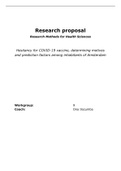Research proposal
Research Methods for Health Sciences
Hesitancy for COVID-19 vaccine, determining motives
and prediction factors among inhabitants of Amsterdam
Workgroup: 9
Coach: Ona Ilozumba
, Vrije Universiteit Amsterdam
Research Methods for Health Sciences
Table of contents
Introduction 2
Concepts, theories and model 4
Qualitative research proposal 7
Methods 8
Work plan 11
Quantitative research proposal 14
Methods 15
Work plan 18
Appendix
A. Survey measures 20
B. Items to assess the perceptions of COVID-19 22
C. Knowledge questionnaire 23
D. Media representation 24
E. Revised Health care system Distrust Scale 25
References 26
1
, Vrije Universiteit Amsterdam
Research Methods for Health Sciences
Introduction
The global COVID-19 pandemic, caused by infection with the novel coronavirus
SARS-Cov-2, has affected billions of people, both through the infection itself and
non-direct impacts on public health, the economy and daily life (1). 6919 deaths
have been reported since the beginning of the outbreak in The Netherlands, with
Amsterdam being in the top-10 cities with the highest relative numbers of cases
and deaths (2). In the past weeks, the reproduction number has risen to 1.22
(3). Moreover, the Gross Domestic Product (GDP) fell by 8,5% in the second
quarter of 2020, compared to the previous quarter (4). Since especially
vulnerable people will suffer from the containment measures, the pandemic has
the potential to exacerbate both health and economic inequalities (5).
With the absence of an effective antiviral medical, the need for a vaccine arose
(1). Researchers are focussing on the development of this vaccine, but the
success of this vaccine also relies on the public acceptance of it, since getting
the COVID-19 vaccine will not be made obligatory in the Netherlands (6). In
recent years the uptake of vaccinations and public confidence in vaccines has
declined globally, as in the Netherlands. This concerned both childhood
vaccinations and adult vaccination programmes (7, 8).
The general acceptance of the future COVID-19 vaccine appears to be low (9,
10). First of all, The World Economic Forum conducted a global survey
(N=20,000) into the willingness of people to get vaccinated. Differences between
countries were noticed, where the Netherlands is below the global average (71%
in the Netherlands, compared to 74% globally) (11). Moreover, an European
survey (N=7,662) showed that 73,9% of 7664 participants from Denmark,
France, Germany, Italy, Portugal, the Netherlands, and the UK are willing to get
vaccinated with this vaccine (12). The herd immunity threshold for Europe is
estimated at 74% (12). This means that the vaccination coverage will not be
sufficient to achieve herd immunity in the Netherlands (12).
Decisions whether to get vaccinated can be seen as a process that depends on
various aspects, also defined as vaccine hesitancy. (13, 14). It is important to
mention the intention-behaviour gap in this research proposal. This means that
having the intention to get or not get vaccinated with the COVID-19 vaccine,
does not directly lead to this behaviour (15).
Studies have been conducted to understand the characteristics of vaccine
hesitancy in adult vaccinations. For instance, vaccine hesitancy was apparent
during the ‘swine flu’, the last worldwide pandemic in 2009. A systematic review
of Bish et al. (2011) found that stronger intentions for vaccination during the
pandemic were associated with the degree of threat and the perceptions of
vaccinations as an effective coping strategy. Other factors associated with higher
intentions were social pressure and getting your information from official health
2




